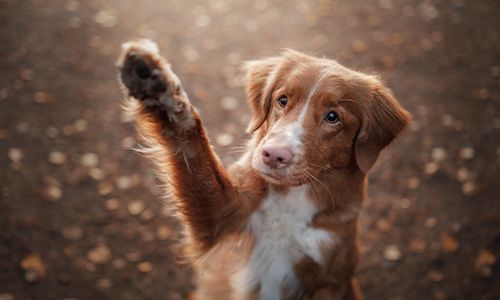Blog
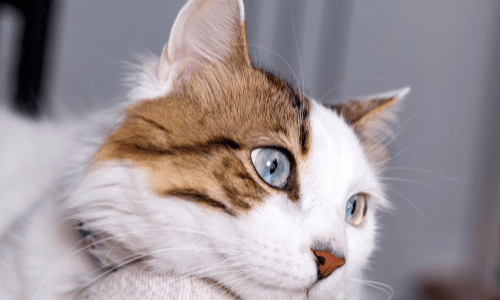
Is Anxiety, Stress, or a Disease Causing Your Cat to Lose Weight? It's only natural to be concerned when your cat starts shedding pounds after years of maintaining the same weight. Sudden weight loss is often a warning sign that something is not quite right with your furry friend's physical or mental health. These nine conditions, diseases, and other factors can affect your cat's weight. 1. Cancer Cancer can certainly cause weight loss, although it's far from the only reason your cat may be losing weight. Other signs that may indicate your cat has cancer can include sores that never heal, lumps and bumps, lameness, stiffness, lack of appetite, pale gums, vomiting, diarrhea, difficulty breathing, or trouble urinating or defecating. 2. Parasites Roundworms, tapeworms, hookworms, and other parasitic infections might be the reason your cat is so thin. Your pet may develop the infection from eating wildlife, swallowing fleas, nursing from an infected mother, or even eating stools from an infected animal. Symptoms of a parasitic infection can include diarrhea, nausea, vomiting, bloody stools, dull coat, and fatigue. You may notice parts of worms or whole worms in your cat's feces in some cases. Some cats drag their bottoms on the floor in an attempt to ease the discomfort caused by a worm infestation. 3. Diabetes Weight loss can also occur if your pet develops diabetes, a disease that occurs when your cat's body stops producing insulin or doesn't make enough insulin. Despite eating more, your cat may lose weight. You may also notice your pet drinks more than usual and also urinates more often. Diabetes is becoming more common in cats due to increasing obesity rates, according to DVM360. 4. Kidney Disease Kidney disease causes waste products to build up in your pet's body. Cats affected by the disease may lose weight, urinate and drink more than usual, and become lethargic. High blood pressure can also occur as a result of kidney disease or failure. 5. Stress Cats that experience stress may eat less and soon begin losing weight. It doesn't take much to stress a cat. Changing your work schedule, adding a new person or pet to your home, loud noises, too few litter boxes in a multi-cat household, and other factors may raise your pet's anxiety level. In addition to changes in eating habits, other signs of stress and anxiety can include a disinterest in grooming or grooming more than usual, spraying, urinating outside the litter box, aggressive behavior, hiding, and meowing frequently. 6. Gastrointestinal Problems Food allergies, infections or inflammatory bowel disease could affect your cat's ability to absorb nutrients needed to maintain a normal weight. Vomiting, diarrhea, itching, changes in your pet's coat, red skin, difficulty defecating, and coughing may be signs of a gastrointestinal issue. 7. Conflicts with Other Pets If your cat is one of several other pets in your home, conflicts with other animals may be the reason for a drop in weight. Other pets may prevent your cat from eating from a communal food dish. If your cat feels threatened, it may go into hiding and rarely attempt to sneak past the other animals. Observing your pets at mealtime can help you determine if a conflict could be related to the change in your cat's weight. 8. Dental Problems It's hard to eat if your teeth hurt, you don't have many teeth left, or your gums are inflamed or infected. If a dental problem is the reason your cat is shedding pounds, you may also see a change in the way your pet chews or notice that your cat drools often. Bad breath, tooth discoloration, and red gums are other signs of dental issues. 9. Old Age Aging may increase your pet's risk of weight loss. In fact, 30 to 40 percent of cats aged 10 to 12 years have difficulty absorbing fats, proteins, and vitamins B-12 and E, according to the University of Illinois College of Veterinary Medicine. Since the risk of diabetes, kidney disease, and other diseases increases with age, trouble absorbing nutrients could be just one factor in your older cat's weight loss. Are you concerned about your pet's weight fluctuation? Contact our office to schedule an appointment. Sources: DVM360: Diabetes Mellitus in Cats, 4/1/09 WebMD, 9/8/18 Pet Health Network: How Can You Reduce Your Cat’s Stress at Home? University of Illinois College of Veterinary Medicine: Causes of Weight Loss in Older Cats, 6/24/15 Cornell Feline Health Center: Chronic Kidney Disease
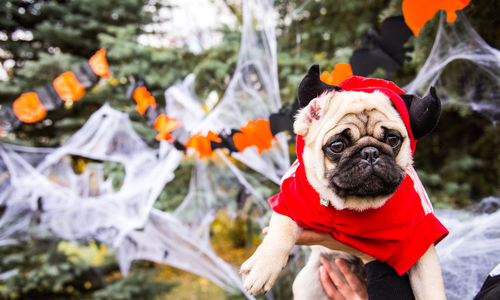
Tips For Safe and Comfortable Pet Costumes Safety is an important consideration if your pet will be dressing up for Halloween or another festive occasion this year. Keeping these recommendations in mind when you shop will help you ensure that the costume you choose is safe and comfortable for your companion. Costumes Should Allow Your Pet to Move Freely Can your pet walk, run, jump, sit, and move normally when wearing the costume? If not, it may be best to keep shopping. Look for costumes made of soft, stretchy material that moves with your furry friend. Be sure to put the costume on your pet before the big day. If it restricts your pet's mobility or doesn't fit well, you'll have plenty of time to find a better choice. Although costumes should allow plenty of room for movement, make sure they aren't too big or loose. Loose or large costumes may pose tripping hazards. Stay Away from Flammable Materials Costumes made with synthetic materials are more likely to catch fire than those made of natural fibers. If a fire does occur, your pet may try to run in an attempt to escape the blaze, increasing the risk of severe burns. Reading the tags or online product descriptions for all of the costumes you're considering can help you avoid inadvertently selecting a highly flammable costume. Make Sure Masks and Hats Fit Well Masks, hats, wigs, and headbands can interfere with vision if they're not the right size for your pet. Make sure eye holes on masks are large enough to allow your pet to see in all directions. Poorly fitting hats, headbands, headpieces, or wigs can drift into your cat or dog's field of vision, making it difficult to spot obstacles. Make sure these items fit your pet snugly to avoid vision problems. Avoid masks that cover your pet's nose and make it hard to breathe. Look for Choking Hazards Dangly decorations, buttons, and elaborate trim make any costume look more authentic but can pose a choking risk. If your pet is a chewer, it may be best to bypass these types of costumes. In addition to triggering choking, swallowed decorations might damage your pet's stomach or intestines. Choose Costumes That Can Accommodate Leashes and Harnesses Parties and celebrations can be a little overwhelming for some pets, particularly if other people and animals are wearing costumes. If your pet tries to run away from a spooky witch or scary clown, a harness or leash will prevent him or her from dashing into the street or disappearing into the bushes. The ASPCA recommends that pets wear identification tags when in costume. ID tags are a good idea even if your pet is microchipped. Good Samaritans who find your pet won't have microchip scanners, which could delay your reunion with your dog or cat. Make Sure Your Pet's Costume Can Be Seen in the Dark That black vampire costume may be a hazard if your pet will be outside when it's dark. Choose costumes that contain bright colors or include reflective trim and materials if you'll be spending time outdoors in the evening. Be Patient Your cat or dog may not like wearing a costume at first. Place the costume on your pet for a few minutes initially, then gradually increase wearing time. If your pet is obviously unhappy, fearful or anxious, or tries to bite and tear the costume, it may not be the best option. Try another costume, or buy your pet a decorated collar or bandana instead. Collars and bandanas offer a festive touch and are well tolerated by many pets. If your pet doesn't like dressing up, consider a more creative approach. Pulling your pet in a small decorated wagon may be a better option than forcing your cat, dog, or small animal to wear a costume. Do you have a few questions or concerns about your pet's physical or mental health? Contact our office to schedule your furry friend's appointment. Sources: ASPCA: Tips on Costumes, Candy and Celebrating Safely with Your Pets This Halloween, 10/26/16 The Humane Society of the United States: Halloween Safety Tips for Pets American Kennel Club: 10 Tips for Dressing Up Your Dog Safely, 10/26/16
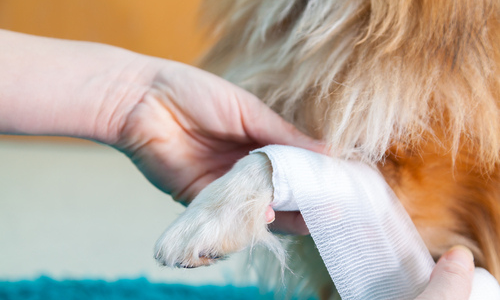
Common Injuries in Dogs Do you know what to do if your dog suffers an injury? These tips can help you care for your pet after an accident. Paw Injuries Paw injuries are particularly common in dogs. Hot pavement, broken glass, and chemicals can cause painful cuts or burns on paw pads. Your dog may limp or favor one leg after a pad injury. If you notice pieces of broken glass or other objects in your pet's paws, try to gently remove them. Don't force the objects if they won't move easily. Apply gentle pressure with a clean cloth if your pet's paws are bleeding. (Be sure to remove glass or foreign objects first.) If you suspect that your pet has burned paws, use an icepack or cool running water to ease discomfort. After you've offered basic first aid, take your pet to the veterinarian as soon as possible. The American Veterinary Medical Association recommends visiting the vet immediately if severe bleeding occurs anywhere on the body or bleeding doesn't stop after five minutes. Soft Tissue Injuries Bruises, tendonitis, bursitis, and strained or sprained muscles are considered soft tissue injuries. Your dog can develop one of these injuries during strenuous physical activity or simply by bumping into a hard object. Soft tissue injuries can happen to any dog but are particularly common in dogs that participate in agility training. Thirty-three percent of canine agility participants experienced injuries while involved in a study published in Veterinary and Comparative Orthopaedics and Traumatology. The injuries most often affected their backs or shoulders. Bruises will generally go away on their own in a few days, but the pain from sprains and strains may last longer. Ice packs and heating pads can help keep your pet comfortable. Check with your veterinarian first before giving your pet painkillers, as some human drugs can be toxic in pets. Rest helps muscles and ligaments heal, although convincing your dog to rest can be difficult. A crate can be helpful if your energetic dog won't stay still. If your pet still limps or is obviously uncomfortable a few days after the injury, call the vet. Bites Bites can be infected if they're not treated promptly. If your pet has been in a fight with another animal, conduct a full body examination to check for bite wounds and other injuries. Clean wounds with soapy water, then apply antibiotic ointment and a bandage. Take your dog to the vet if wounds continue to bleed or you're concerned about less noticeable injuries. Bites can damage your pet's muscles, bones, or organs, even when they don't look particularly serious. It's also important to call the vet if your dog was bitten by a cat. Cats have long teeth that inject bacteria in the bite wound, increasing the risk of infection. Auto Injuries Despite all of the measures you take to protect your pet, your dog may dash in front of a car or truck one day. Even seemingly minor accidents can cause serious internal injuries. Your dog may seem fine initially but could soon develop serious health issues without prompt veterinary treatment. Bandage wounds and stabilize possible broken bones with splints made of towels, magazines, or other stiff materials before driving your pet to the veterinary office. Cranial Crucial Ligament Tear Cranial crucial ligament (CCL) tears made the list of top five dog injuries compiled by ASPCA Pet Health Insurance. The ligaments help keep your dog's knees stable. If your dog has a CCL tear, he or she may be reluctant to put any weight on the affected leg, or you may hear a clicking sound when your dog walks. Partial tears can cause pain when exercising, although your pet may seem fine when resting. Surgery is the best option if your dog develops CCL. Without surgery, lameness may become permanent. Nail Injuries Your pet's nails may bleed if you cut them too short, or your dog catches the nail on something when running or jumping. Hold a styptic pencil against the nail to stop the bleeding. If you don't have a pencil, put flour on the nail instead. Take your dog to the vet if the bleeding doesn't stop after a few minutes or the entire nail is missing. Are you concerned about an injury or change to your dog's health? Contact our office to schedule a convenient appointment. Sources:
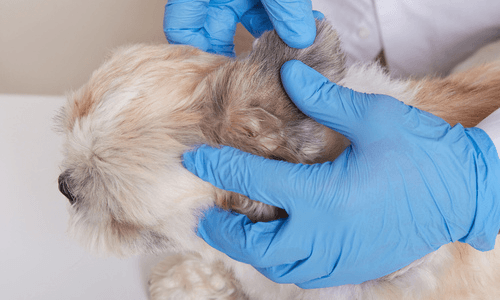
Signs That Your Pet May Have Cancer As unfair as it may seem, cancer isn't just a human disease. Your furry friends may also be affected by the potentially deadly illness. Learning about common signs of cancer during Pet Cancer Awareness Month in November can help you protect your pet's health. Common Signs of Cancer in Pets If your pet displays any of these signs, it's time to pay a visit to your veterinarian: Lumps and Bumps - Lumps and bumps, particularly ones that seem to be getting bigger, are a cause for concern. Although growths aren't always cancerous, it's important to rule out the disease. Conduct a home exam to look for lumps, bumps, sores, and other signs of health problems at least a few times every month. A Change in Appetite - If your normally ravenous dog, cat, or small animal has suddenly lost interest in eating, you'll need to determine the cause of the sudden change. Your pet may not enjoy mealtime if tumors make eating painful or trigger nausea. Weight Loss - Eating less will certainly cause your pet to lose weight, but weight loss can also occur even if your pet's eating habits haven't changed. Bad Breath - All pets have bad breath occasionally. If the odor is particularly strong and never improves, a tumor may be the cause. Diabetes, or kidney, liver, or gum disease can also cause bad breath. Enlarged Lymph Nodes - Some lumps may actually be enlarged lymph nodes. Lymph nodes remove waste and germs from your pet's body and may become swollen if your pet is sick or has a form of cancer called lymphoma. Lymphoma is more common in cats than dogs, according to the American Veterinary Medical Association. Lymph nodes in dogs and cats are located on either side of the jaw, in front of the shoulders, on the groin, and behind the knees. Vomiting or Diarrhea - All pets experience diarrhea and vomiting occasionally, particularly if they eat something they shouldn't. Frequent vomiting or diarrhea are unmistakable signs of illness and can lead to dehydration if not treated promptly. Disinterest in Usual Activities - Pets who are sick or have cancer may become lethargic and lose interest in playing, going for walks, and other activities. Swollen Abdomen - Call your veterinarian as soon as possible if your pet's abdomen begins to swell, and the animal isn't pregnant. Abdominal swelling can be caused by bleeding, cancerous tumors, parasites, or bloat. Difficulty Walking - Lameness may also be a sign that your pet has cancer. If cancer invades your pet's bones, walking or jumping may become painful or difficult. Coughing or Trouble Breathing - Persistent coughing or difficulty breathing may occur if your pet has cancer. If you notice that your pet is struggling to breathe, call or visit your veterinarian immediately. Sores That Don't Heal - Sores or ulcers that never seem to get better may also be cancerous. Difficulty Defecating or Urinating - Tumors may make it difficult or impossible to urinate or defecate. If your pet hasn't urinated in 24 hours, seems to be in pain, or strains to urinate or defecate, let your veterinarian know right away. In addition to cancer, trouble urinating can be caused by a urinary tract blockage that could kill your pet if treatment isn't begun immediately. Bleeding - Bleeding from the nose, mouth, ears, penis, vagina, rectum, or other parts of the body should be evaluated. In some cases, bleeding may be related to an injury that's difficult to see. Bleeding, even if you only notice it once or twice, warrants a trip to the veterinarian. Does your pet have any of these cancer signs and symptoms? Contact our office to schedule an appointment for your pet. Sources: AVMA: Cancer in Pets https://www.avma.org/resources/pet-owners/petcare/cancer-pets Animal Cancer Foundation: 10 Warning Signs of Cancer Merck Manual: Causes of Cancer, 5/20
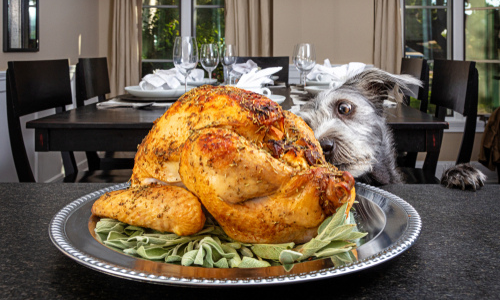
Thanksgiving Day Safety Tips for Your Pet Thanksgiving Day may be one of your favorite holidays, but Turkey Day can be dangerous for your pets. Following a few of these tips will help you ensure that your furry friends don't suffer a Thanksgiving emergency. Limit Special Treats It's best to stick to your pet's usual diet on Thanksgiving. Although a tiny taste of cooked turkey probably won't bother your pet, eating some traditional Thanksgiving foods may make your pet sick. Stuffing and other foods that contain onions or garlic can cause anemia in cats and dogs, while grapes and raisins may cause kidney failure. Even powdered onions or garlic can pose a problem. Mashed potatoes may also cause a problem. The milk or sour cream used to make the dish could trigger a bout of messy, uncomfortable diarrhea for your lactose intolerant pet. Don't turn your back on your raw turkey while you prepare Thanksgiving dinner. In just a few seconds, your dog or cat can jump up on the counter and take a bite or lick of the bird. Eating or licking raw meat increases your pet's risk of developing salmonella or bacterial infections. Turkey skin, whether cooked or uncooked, can also sicken your pet. The American Veterinary Medical Association notes that eating fatty turkey skin can cause life-threatening pancreatitis. Don't let your pet gnaw on turkey bones either. The bones can become stuck in your pet's throat and may splinter easily, causing painful cuts. Other foods to avoid include: Chocolate Yeast Scallions Foods that contain the sweetener xylitol Raw eggs Prepare a Sanctuary for Your Pet Some pets love everyone, others become a little anxious or fearful around strangers or groups of people. If your pet doesn't like large, loud gatherings, it may be happier spending the day away from the Thanksgiving festivities. Before the guests arrive, place food, water (and a litter box if you have a cat) in a quiet room and close the door. Stop by the room periodically to check on your pet. Make Sure Your Dog or Cat Wears an Identification Tag While you're busy saying goodbye to your guests, your pet may decide it's the perfect time to dash outside. An ID tag attached to your pet's collar will increase the likelihood that your dog or cat will be reunited with you if it becomes lost. The tag should include the pet's name, and your name, address, and telephone number. ID tags are important even if your pet has been microchipped. Although veterinary offices and shelters usually have microchip scanners, your neighbors won't be able to locate or read the chips. Take Out the Trash Even a normally well-behaved pet may be unable to resist temptation when the trash can is unattended. After all, the trash can contains all of the Thanksgiving foods that are usually off-limits to your pet. Food isn't the thing you need to worry about in the trash. String used to truss the turkey can wrap around your pet's intestines if swallowed, requiring emergency surgery. Use Restraints When Traveling Unrestrained pets may be at risk for serious injuries if an accident happens when you're driving to Grandma's house. Loose pets may also interfere with your concentration and force you to take your eyes off the road. Restrain your pet with a harness attached to a seat belt, or secure your pet's carrier firmly in place with the seat belt. Exploding airbags can injure or be fatal for your pet. For safety's sake, place your pets in the back seat. Don't let pets stick their heads out the windows. They may hit their heads on posts or other obstacles or experience eye injuries from airborne particles and debris. Put Decorations Out of Reach It's only natural for pets to be interested in the decorations that suddenly appear around Thanksgiving. Unfortunately, an inquisitive cat can knock over a lit candle, or a curious dog can eat non-edible parts of decorations quicker than you can say "leave it". Place decorations in high places that aren't accessible to your pet, and remove centerpieces as soon as your meal is over. Whether your dog eats something it shouldn't during the holidays or your cat or small animal needs a checkup, we're here to help you care for your pets. Call our office if you have a question or want to schedule an appointment. Sources: The Humane Society of the United States: Travel safely with your pet by car, airplane, ship or train American Veterinary Medical Association: Thanksgiving Pet Safety ASPCA: Thanksgiving Safety Tips
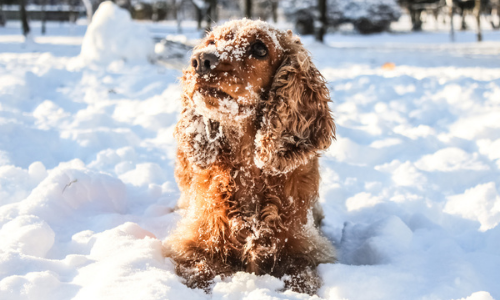
How to Protect Your Pet When the Weather Turns Cold Cold weather can be dangerous for your pet's health, causing ailments ranging from skin irritations to frostbite. These six tips will help you keep your pet safe and comfortable no matter how low the temperature drops. 1. Use Pet-Safe Antifreeze Antifreeze may not look very appetizing to you, but animals are drawn to its sweet scent. Licking a small puddle of antifreeze can cause kidney failure and even death in pets. Since you never know when your radiator will spring a leak, it's a good idea to replace your antifreeze with a pet-safe version. Before adding pet-safe antifreeze, flush out the old antifreeze and dispose of it. If you just top off the antifreeze with the pet-safe type, your pet may still be at risk. Wipe up antifreeze spills and puddles immediately to protect your pet and other animals. 2. Pay Extra Attention to Your Pet's Paws and Pads Frozen surfaces, rock salt, and ice-melting chemicals can be hard on your pet's paws. Wipe off your pet's paws after every walk or outdoor play session to prevent painful irritation. Applying a liberal coat of petroleum jelly to your dog or cat's paws before going outside can be a good preventative measure. Pet-sized boots and booties offer another option. The footwear prevents paws and pads from coming in contact with dangerous substances and also reduces slips and falls on icy surfaces. Paw inspections are particularly important on snowy or icy days. Remove clumps of snow and ice stuck between your pet's toes promptly to prevent irritation or frostbite. 3. Limit Outside Time on Freezing Cold Days Your pet's natural fur coat makes chilly days more comfortable but may not offer adequate protection on very cold days. If it's so cold that you don't want to spend more than a few minutes outside, bring your pet inside. Although dog houses can provide some degree of shelter from the wind, your pet will still be affected by the cold and could develop frostbite if left outside for too long. Some dogs will be more comfortable wearing sweaters when venturing out on cold days. A sweater may be a good idea for short-haired or hairless pets, old, young, frail, or sick animals. 4. Make Sure Your Pet Wears Tags It's never a good time to lose your pet, but the winter is a particularly bad time for your furry friend to go missing. Bad weather can complicate your search and put your pet's life in jeopardy. A collar with a tag may decrease the amount of time your lost pet spends outdoors before it's reunited with you. Put an ID tag on your dog or cat even if your pet is microchipped. Veterinary offices and shelters will have microchip readers, but good samaritans won't have these devices. 5. Protect Your Pet from Indoor Hazards It only takes a second for an injury to occur if your pet is near a fireplace, heater, or lit candle. Place a baby gate enclosure around your fireplace or heater to prevent your pet from wandering too close. Sparks from the fire can cause burns, as can a brush with a heater. If you use a kerosene heater, it's particularly important to keep the unit away from your pets. Your playful dog or cat could knock over the heater, starting a fire. Battery-operated flameless candles are a better choice if you have a curious cat or dog. The candles provide all the ambiance of the real thing, yet don't pose a fire hazard. 6. Don't Leave Your Pet in a Cold Car Most people know that hot cars can quickly kill pets and children during the summer months. Unfortunately, cold cars are just as dangerous. The ASPCA notes that cars tend to hold in the cold, acting as refrigerators. If you'll be out of the car for more than 10 minutes, bring your pet with you or better yet, leave it at home. Do you have a question about your pet's health or need to schedule an appointment? Contact our office and let us know how we can help you. Sources: ASPCA: Cold Weather Safety Tips WebMD: Pet Winter Safety: Prepping Your Pet for Winter Weather American Veterinary Medical Association: Cold Weather Animal Safety
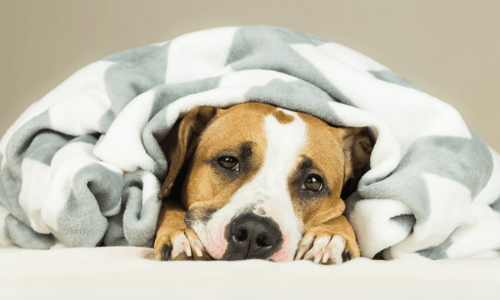
Can My Dog Catch a Cold? Colds don't just make people miserable. Dogs can also experience sneezing, coughing, congestion, and other common cold symptoms. What Are the Symptoms of Colds in Dogs? You're probably already familiar with the symptoms of colds in dogs, as they're pretty much identical to the ones you experience. In addition to sneezing, coughing and nasal congestion, signs and symptoms may include watery eyes, runny nose, sore throat, and body aches. Your pet might not be as energetic as usual, which is a good thing. Rest is very important, as it helps your dog recover from the viral infection. Can My Dog Catch a Cold from Me? Pets and people can share some illnesses but colds usually aren't among them. Several different types of viruses can cause cold symptoms in dogs. Is It a Cold or Something Else? Cold-like symptoms can also occur if your pet has another viral illness, such as canine flu or kennel cough. If your coughing dog sounds a little like a honking goose, kennel cough may be the cause of the symptoms. Kennel cough can spread quickly through animal shelters, doggy daycares, and anywhere else dogs are in close contact with each other. The illness can be severe in puppies under 6 months or dogs with immune system conditions, according to the American Kennel Club. Most dogs get better on their own, but some will require veterinary treatment. The bordetella vaccine can reduce your pet's risk of developing kennel cough. Canine influenza may also cause many of the same symptoms as colds. The illness is very contagious. In fact, nearly all dogs exposed to it become infected, although only 80 percent show symptoms, according to the American Veterinary Medical Association. Symptoms of canine flu may include sneezing, runny nose, fever, and a dry or wet cough. In some cases, dogs may develop pneumonia or a secondary bacterial infection. The canine influenza vaccine can decrease your pet's risk of getting the flu. Are you worried that your pet's cold symptoms may actually be caused by the coronavirus? Although some dogs have tested positive for the virus, the numbers are fairly low. Most dogs that were infected with the coronavirus had mild symptoms, and none were fatal, according to the Centers for Disease Control and Prevention. Other illnesses that can cause upper respiratory symptoms include fungal or bacterial infections, allergies, worms, and heart disease. What Should I Do If My Dog Has a Cold? Since it's not easy to tell what type of illness is causing your dog's symptoms, it's a good idea to pay a visit to the veterinarian. Your pet's veterinarian can provide a diagnosis and treatment options no matter what the cause of the symptoms. If your dog does have a cold, a cool-mist humidifier will ease nasal congestion and soothe your pet's sore throat. Be sure to provide plenty of water to ensure that your pet stays hydrated. When your furry friend's nose runs, use a soft, moist washcloth to remove mucus. If your pet usually accompanies you on your daily run or long walk, leave him or her at home. Over-exertion may cause your pet to feel worse or make it difficult for your dog to keep up with you. Call the vet if your pet's symptoms worsen or don't improve after a week, or your dog isn't interested in eating or drinking. Don't wait a week to call if your pet has a chronic condition, or is a senior dog or puppy. Let the veterinarian know immediately if your pet has difficulty breathing, walking, or standing. Are you concerned about your dog's cold symptoms? Contact our office to schedule an appointment. Sources: American Kennel Club: Kennel Cough in Dogs - Symptoms, Treatment and Prevention, 1/23/19 American Veterinary Medical Association: Canine Influenza American Kennel Club: Can Dogs Get Colds?, 8/23/17 PetMD: Do Dogs Get Colds?, 1/15/20 Tufts University: Can You Give Your Dog Your Cold?, 4/16/19



